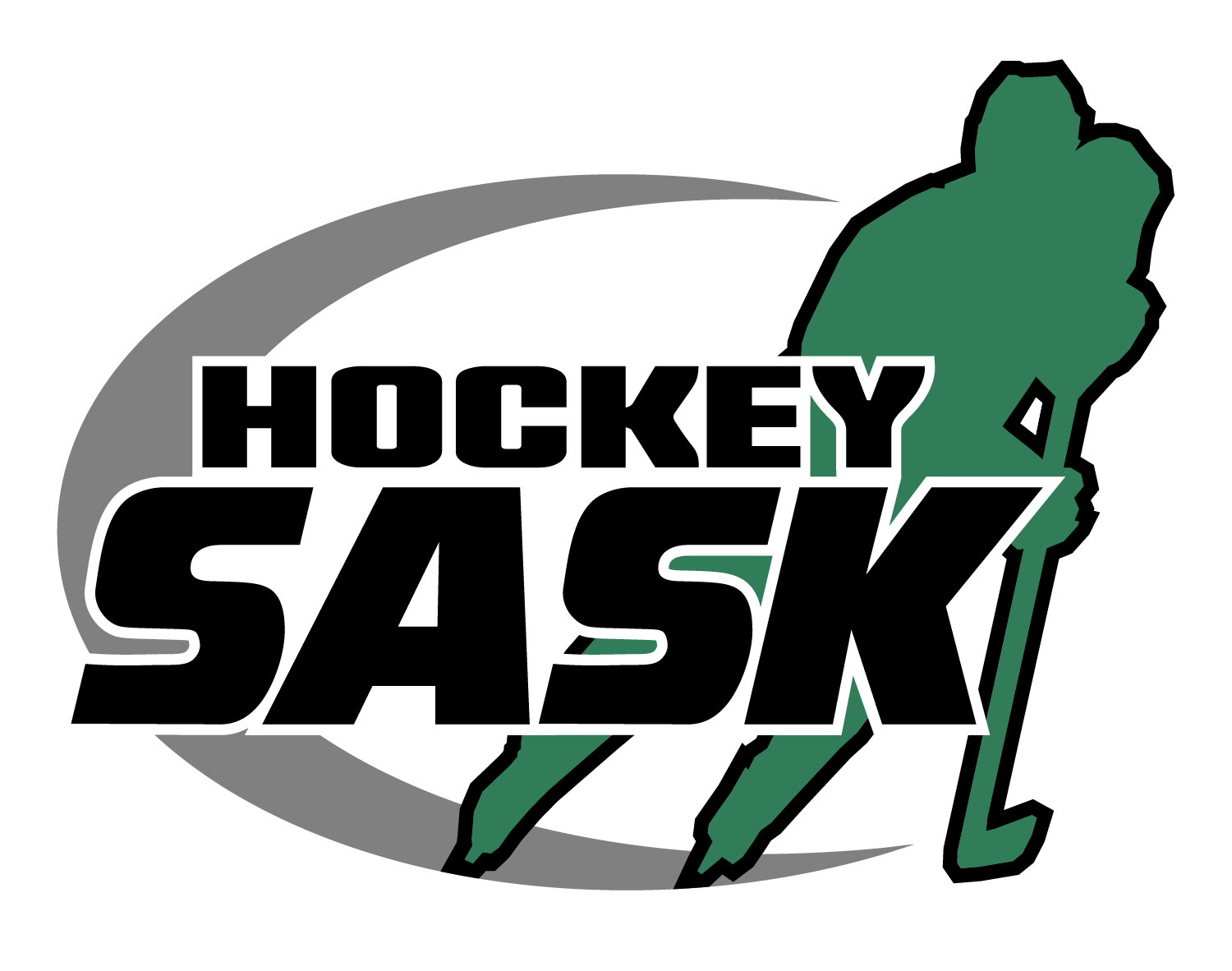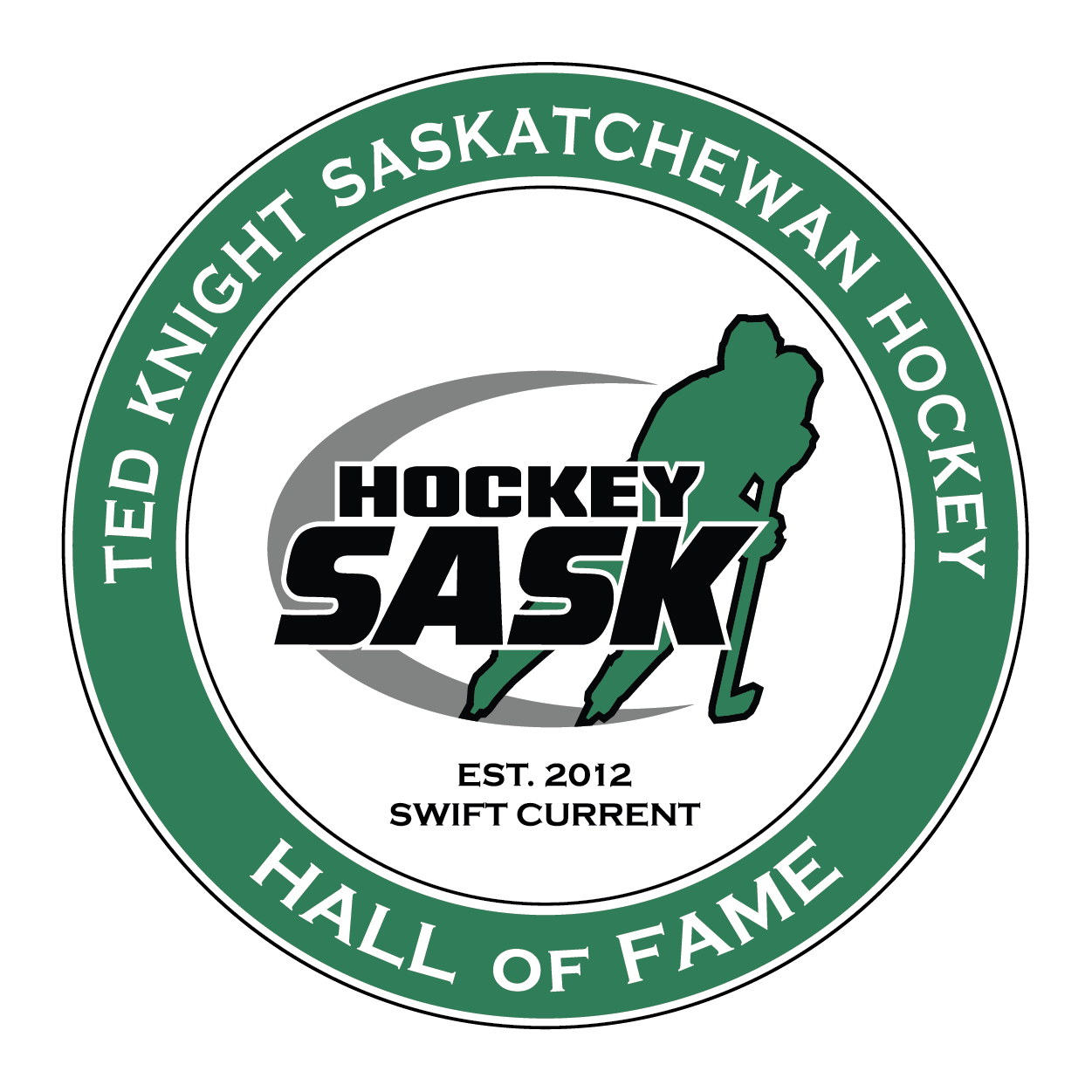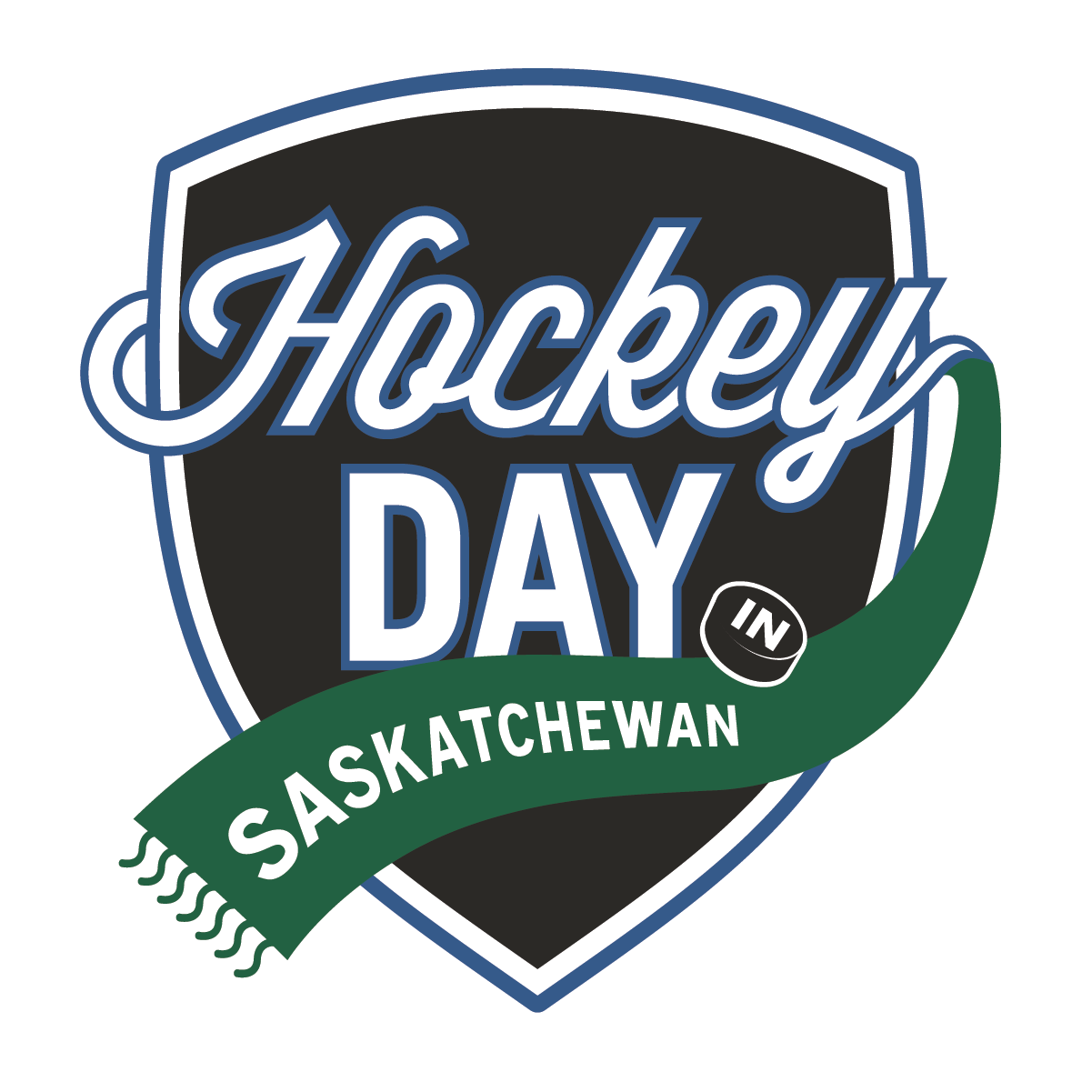11.4 Maltreatment Awareness Day - Nov. 4th, 2025
11.5 Maltreatment Awareness Day - Nov. 5th, 2025
Hockey Saskatchewan, Hockey Canada, and our partnering leagues and associations are committed to creating a safe environment for all participants. On this year's Maltreatment Awareness Days, November 4 and 5, 2025, we want to share, remind, and educate everyone involved in our game about the Hockey Canada Rule Book, specifically Section 11 and the issue of maltreatment within the game.
This season, we are focusing on the rule book's Section 11.4 on Nov.4 and Section 11.5 on Nov.5 to help create a better understanding of what is unacceptable in the hockey rink and the consequences that may follow.
By enforcing these rules and recognizing Maltreatment Awareness Days, Hockey Saskatchewan is working to prevent discrimination and ensure respect, fairness, and safety for everyone involved in the game. These are vital steps toward making hockey a place where all feel valued, respected, and empowered to play.
Hockey Saskatchewan wants to focus on:
- What is maltreatment?
- Rule 11.4: Discrimination
- Rule 11.5: Physical Harassment of Officials
- Investigation and discipline
- Shared respect
- Maltreatment for players
- Maltreatment for coaches
- Maltreatment for parents and families
- Maltreatment for officials
- Maltreatment for Minor Hockey Associations
- Impact on players’ mental and physical health
- Long-term effects on the sport’s reputation and growth
What is Maltreatment?
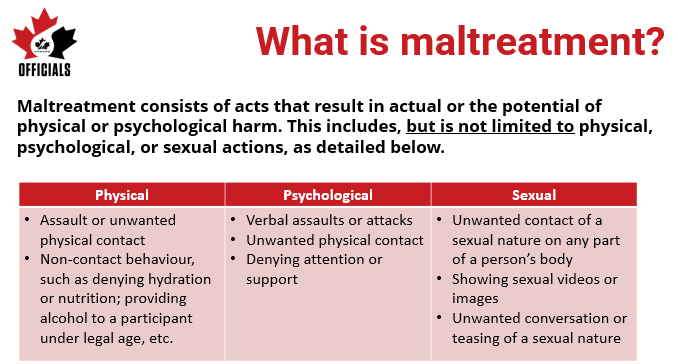
Rule 11.4: Discrimination
Any player or team official who engages in taunts, insults, or intimidation based on discriminatory grounds will be assessed a Gross Misconduct penalty. Discriminatory grounds include the following, without limitation:
- Race, national or ethnic origin, skin colour, or language spoken;
- Religion, faith or beliefs;
- Age;
- Sex, sexual orientation or gender identity / expression;
- Marital or familial status;
- Genetic characteristics;
- Disability.
The Referee will report the individual(s) by completing a Game Incident Report including full details and submitting the Report to the appropriate Member or league delegate.
Note 1: If an incident occurs that was not witnessed by the Officials and is reported to the Referee, the Referee will report the individual(s) to an appropriate member of each team’s bench staff and will complete a Game Incident Report including full details and will submit the Report to the appropriate Member or league delegate.
Note 2: If any behaviour described in Rule 11.1, 11.2 or 11.3 includes behaviour described in Rule 11.4, the player, goaltender or team official must be penalized under Rule 11.4, in
addition to any other penalties that individual might receive.
INTERPRETATIONS
Interpretation 1 Rule 11.4
Hockey Canada recognizes that it is necessary to provide further guidance to all participants to ensure consistent application of this rule. The objective is to have uniform application of this rule, avoiding the use of personal preferences or sensibilities. To assist in determining whether conduct is discriminatory (Rule 11.4), abusive (Rule 11.2), or unsportsmanlike (Rule 11.1), officials should apply the following test:
- Question 1: Was the comment made in a negative context, with the intent to taunt, insult, or intimidate another person?
- Question 2: Was the nature of the insult based on “discriminatory grounds”, as defined by Rule 11.4?
If the answers to BOTH questions are “yes”, then a Gross Misconduct penalty under Rule 11.4 must be assessed to the offending player.
If there is any doubt regarding the nature of a comment, officials should strictly apply this test to ensure that the game of hockey is free from maltreatment.
Rule 11.5 Physical Harassment of Officials
The safety of all participants is a priority for Hockey Canada. It is understood that on-ice officials may need to physically intervene in altercations to deescalate the situation and/or protect vulnerable players. Officials should only intervene in an altercation when it is safe for them to do so, with the sole purpose of deescalating the altercation. Players that are willing participants in an altercation must be aware of the risks to their own safety and are responsible for their actions, if they compromise the safety of the intervening officials.
When on-ice officials are required to intervene in altercations, it is understood that they will need to make physical contact with players and that the on-ice officials assume a certain level of risk of incidental contact. This rule is intended to address incidents where players make contact with an official that is more than incidental. Furthermore, officials should be aware that the amount of physical intervention they use to deescalate altercations must follow the same principles of minimizing the risk for all participants involved.
For the purpose of this rule, ‘officials’ refers to referees, linespersons, and off-ice officials.
Note: If any behaviour described in Rule 11.5 includes behaviour described in Rule 11.4 – Discrimination, the individual must be penalized under Rule 11.4, in addition to any other penalties that individual might receive.
11.5 (a) No Minor penalty may be assessed under this rule.
11.5 (b) No Major penalty may be assessed under this rule.
11.5 (c) A Match penalty will be assessed to any player or team official who:
- Conducts themselves in such a way that physically threatens or intimidates an Official, without making physical contact;
- Deliberately applies physical force to an official with a minimal to moderate degree of violence, without causing injury; or
- Deliberately applies physical force to an official with a high degree of violence or causes injury to an official by way of any intentional contact.
Note 1: Where a player or team official has been assessed a Match penalty under this rule, the Referee will report the individual(s) by completing a Game Incident Report, including full details and submitting the report to the appropriate Member or league delegate.
11.5 (d) No Misconduct penalty may be assessed under this rule.
11.5 (e) A Game Misconduct penalty will be assessed to any player or team official who, in the course of attempting to continue or continuing to participate in a gathering or altercation, accidentally applies physical force to an official.
INTERPRETATIONS
Interpretation 1 Rule 11.5 (c)
QUESTION: A player on the Penalty Bench grabs a Timekeeper or any Off-Ice Official. What penalty is to be assessed?
ANSWER: A Match penalty must be assessed.
Investigation and Discipline
Parties involved in incidents of maltreatment may be contacted by a Hockey Saskatchewan Independent Third Party (ITP) Investigator. The ITP Investigator will provide a report to the Hockey Saskatchewan Discipline Coordinator, who will make a ruling and determine the length of suspension.
Please note that the minimum suspension guideline for a Rule 11.4 penalty for all levels of hockey, as per Hockey Canada guidelines, is five games. The suspended individual will also be required to complete the Triple-Impact Competitor: A Leadership Workshop for Athletes training prior to returning to hockey. Failure to complete the course will result in an indefinite extension of the suspension.
Shared Respect
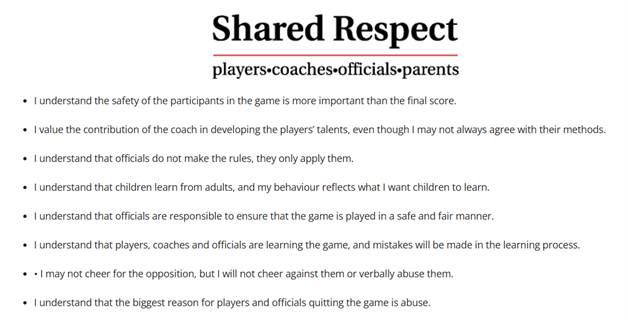
Maltreatment for Players
Be aware of the language, tone, and comments you use and how they can harm others.
- Seek opportunities to learn about those around you, focusing on your differences and similarities and how they contribute to a healthy team dynamic.
- Understand the difference between impact vs. intention. Be aware of the impact of your actions. Even if our intentions are innocent or if we are reacting emotionally in the heat of the moment, words and behaviors can have significant consequences.
- Recognize that chirping or trash-talking has no relevance to the outcome of the game and is not an acceptable part of the game.
- Don’t be a bystander. If you see or hear something inappropriate, talk to your coaches, officials, parents, or leaders.
- Understand that hockey is a fast game; officials are human, and mistakes will be made.
- Recognize that officials wearing green armbands are younger officials like you, learning the game, and should be treated with respect.
Maltreatment for Coaches
You play a pivotal role in shaping a positive and inclusive environment for your players, both on and off the ice.
Here are some essential resources designed to support your efforts:
- Strive to create a welcoming environment where everyone, regardless of race, culture, gender identity, sexual orientation, or ability, can participate and thrive.
- Ensure that you have completed all the coaching requirements, including the Respect in Sport Team Official Course.
- Lead by example; your actions on the bench reflect the attitudes and comments of your players. Do not promote, encourage, or tolerate maltreatment within your team and/or organization.
- Understand that hockey is a fast game; decisions must be made quickly, and officials aren’t out to get you. Mistakes will be made, and there will be decisions with which you disagree, but communication must always remain respectful.
Maltreatment: Parents and Families
Your support is essential in creating a positive, inclusive hockey experience.
- Be a positive role model through your actions. Make a difference by showing respect and integrity when interacting with coaches, officials, players, and other parents.
- Stay informed by understanding the issues surrounding safe sport. Take time to learn about the dynamics of inclusivity and respect in hockey.
- Familiarize yourself with your association’s and Hockey Saskatchewan’s guidelines to support a fair and respectful environment.
- Recognize that officials wearing green armbands are younger officials in the game and should be treated with respect. The green armband symbolizes that they are doing their best for the sport of hockey.
- If you notice bullying, harassment, or harmful behavior, trust your instincts and take action. Use “I” statements to express your feelings and create dialogue (e.g., “I felt uncomfortable when I saw…”). We need the adults in our rinks to act like adults.
- Educate yourself by completing the Respect in Sport Parent/Guardian Course, whether it is mandatory or not.
Maltreatment for Officials
Be aware and ensure positive experiences for every player.
- Be mindful of all interactions on the ice, as maltreatment can occur at any moment. Your awareness helps create a safer environment for everyone.
- Let players and team personnel know that their concerns about maltreatment are important. Make it clear that you’re there to listen and support them.
- If an in-game allegation is reported to you, even if you didn’t witness it, inform the appropriate bench staff. This ensures that the incident is properly documented in the Game Incident Report.
- Remember, the playing rules apply to all participants. As officials, it’s your responsibility to enforce these rules consistently, promoting respect and fairness on the ice while addressing maltreatment.
- Do not be a bystander; if you hear something, address it. This may involve assessing a penalty or having a difficult conversation.
- Full communication between coaches, players, and officials is crucial for conflict management on the ice. Check out this video on Respectful Communication and Expectations: Hockey Saskatchewan Video.
Maltreatment for Minor Hockey Associations
As a valued member of Hockey Saskatchewan, we encourage each MHA and team to establish clear policies and procedures to address unacceptable conduct within your organization. By fostering a proactive approach, we can create a supportive environment for everyone involved.
Here’s how you can contribute:
- Promote a positive culture for every member to help maintain a safe and respectful atmosphere by preventing harassment and abuse in all aspects of your organization. Together, we can make an impact.
- Encourage open communication regarding any participant’s safety concerns. This ensures that issues are managed appropriately and in line with your established policies and procedures.
- Facilitate open conversations with staff and volunteers about creating inclusive environments. Use prompts like, “What does a welcoming environment look like to you?”
Impact on Players’ Mental and Physical Health
Maltreatment can have severe psychological and physical effects on young athletes, leading to long-term mental health challenges, diminished self-esteem, and increased anxiety. A study by Stirling and Kerr (2009) highlights the pervasive effects of emotional abuse in sports, showing that athletes who endure maltreatment may experience depression, anxiety, and a loss of enjoyment in the sport. The negative psychological effects can lead to burnout or the abandonment of a promising athletic career.
Failing to address maltreatment reinforces the idea that such behavior is acceptable or unavoidable in competitive environments. Players who receive support and protection are more likely to thrive in their athletic performance and overall development, fostering resilience and commitment to the sport.
Long-term Effects on the Sport’s Reputation and Growth
Ignoring maltreatment has broader consequences for the future of hockey. When young players experience harm within the sport, it can lead to disillusionment and withdrawal, deterring others from participating in the future. As more attention is drawn to the treatment of athletes, sports organizations that proactively address these issues will be better positioned to attract new players, sponsors, and fans.
Creating a safe, inclusive, and supportive environment contributes to hockey’s positive reputation as a sport that values its players’ well-being. This environment encourages continued growth, participation, and respect for the sport at all levels, ensuring its future as a viable and respected athletic pursuit.
Addressing maltreatment in hockey is a responsibility shared by all stakeholders—players, parents, coaches, and administrators. By proactively addressing harmful behaviors, each person involved in the sport can foster a safe, supportive environment that enhances young athletes’ growth, health, and success. Maltreatment left unchecked not only damages individuals but also undermines the integrity of the sport. Hockey has an opportunity to lead by example, demonstrating that the safety and well-being of players come first.






